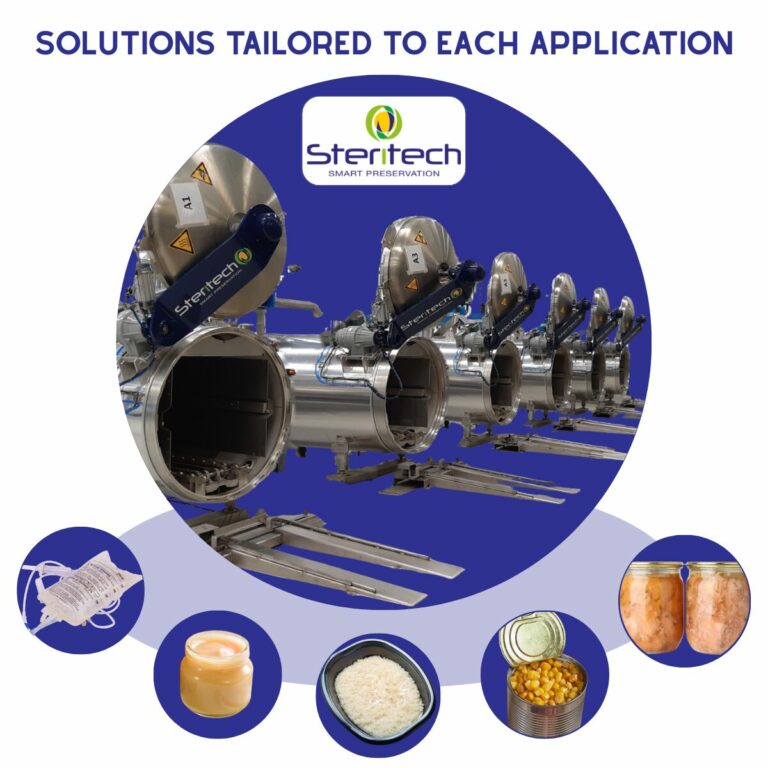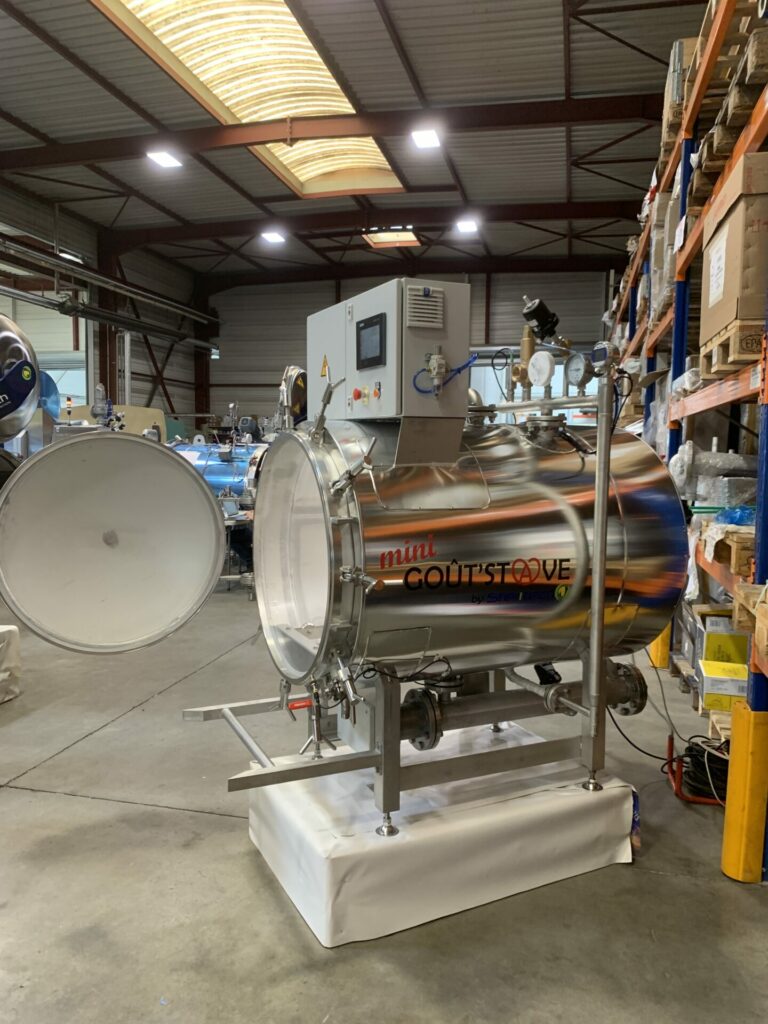
Over the centuries, mankind has progressively secured the preservation of its food. We have invented techniques to eliminate all bacteria and micro-organisms harmful to our health. Pasteurization and sterilization are just two examples. Find out more about the differences between pasteurization and sterilization here.
The technical process of pasteurization
Invented in the 19th century by the French scientist Louis Pasteur, pasteurization is a process of increasing temperature over a given period of time. Pasteurization was patented in 1865.
The 2 types of pasteurization according to storage temperature
Steritech autoclaves can be used for two types of pasteurization.
- Pasteurization of products with an acid pH below 4.5. They can then be stored at room temperature.
- Pasteurization of products with a pH above 4.5. They should then be kept in a cool place.
The objectives of pasteurized food processing
The pasteurization heat treatment destroys pathogenic bacteria present in a product. However, pasteurization destroys neither certain spores nor the most resistant strains of micro-organisms.
- Products with a pH below 4.5: some pathogenic micro-organisms are destroyed. The product’s acidity “completes” the preservation process. No micro-organisms can develop.
- Products with a pH above 4.5: some pathogenic micro-organisms (in all their forms) are destroyed. Refrigeration completes the preservation process.
Shelf life for pasteurized products
The shelf life of pasteurized foods depends on theacidity of the product.
- Products with a pH below 4.5: more than 12 months with DDM (minimum durability date). The words “best before” must appear on the packaging.
- Products with a pH above 4.5: these are perishable foods. A few months with a best-before date. The words “best before” must appear on the packaging.
The technical process of sterilization
Sterilization is a temperature-based food preservation process. Depending on sterilization protocols and equipment, the heating temperature can reach at least 121°C under a pressure of 100 kPa, for a period of time that depends on the product.
The 2 sterilization processes for food products
There are different types of low-temperature sterilization (chemical, UV or ionizing radiation, or filtration) specifically adapted to medical equipment. Only high-temperature heat treatments such as autoclaving can be used to sterilize food products. These include
- dry heat sterilization;
- moist heat sterilization.
Objectives of the sterilization treatment process
The aim of the sterilization process is to remove all microbes from a food preparation. Biological agents such as spores and pathogenic organisms are eliminated by raising the temperature for a given period of time.
The differences between pasteurization and sterilization processes
The first difference between sterilization and pasteurization concerns its inventors. It was Nicolas Appert, at the end of the 17th century, who discovered that preserving food by sterilization (or appertization) resulted in fewer food-borne illnesses. Pasteurization, on the other hand, was discovered by French physician Louis Pasteur in the following century.
Temperature differences
In the sterilization process, the temperature exceeds 100°C. All pathogenic organisms are destroyed, including spores. Canned goods can then be stored at room temperature.
On the other hand, pasteurization temperatures remain below 100°C. As not all microbes are destroyed, pasteurized food must be kept cold for non-acidic products. A best-before date must also be respected.
The organoleptic and nutritional properties of foods are slightly modified by both processes.
Food shelf life in each process
The shelf life of a pasteurized product is shorter than that of a sterilized product. This is because pasteurization does not destroy all pathogenic organisms, resulting in a shorter shelf-life.
Products concerned by each process
Pasteurization can be applied to all types of foodstuffs: milk and all its by-products (cream, butter, etc.), fruit juices or beverages (wine, cider or beer), jams or even meat. All can be pasteurized, but some, such as ready-made meals, must be kept refrigerated.
Sterilization also covers a wider range of products. These include whole fruits and vegetables, pulses and ready meals.
Steritech does not manufacture continuous pasteurizers for fruit juices or milk. In most cases, liquids (juice or milk) can be pasteurized before bottling. Tunnel pasteurizers are another solution, generally less expensive and less technical than autoclaves, but sufficient for pasteurization without the need for back pressure. Our machines are capable of pasteurizing these products, the liquid and the packaging at the same time, the whole being hermetically sealed.
Different treatment times and temperatures for different processes
For both dry and moist heat sterilization, the duration and temperatures to be reached vary according to the product concerned.
The type of packaging (container and lid) best suited to the product
Both the sterilization and pasteurization processes are particularly well suited to different types of preserves. In the first instance, they are used with preserves in glass jars or jars with twist-off lids. The glass bottle can also be used to sterilize vegetable soups, for example. These preserves can then be consumed whatever the season.
Other types offlexible packaging, such as Doypacks or plastic trays, can also be used for sterilization or pasteurization. They require appropriate management of back pressure in the autoclave to avoid deformation.
Why use pasteurization or sterilization?
Many “technical” reasons have been given for comparing the two processes of sterilization and pasteurization. Let’s change the focus for a moment and look at other criteria for comparison.
A gain in food sovereignty
Alongside the concept of food security, to which Steritech is very attached, the idea of food sovereignty is favorable to the notion of preserving. The variability of harvests due to climatic phenomena (droughts, heatwaves, lack of water or early frosts) has become the norm. Thanks to sterilization, preserves can be stored for several years at room temperature.
Eco-friendly cooking and preserving
Since cooking can be carried out at the same time as heat treatment, Steritech autoclaves are “2-in-1” solutions. What’s more, this type of preservation requires no energy consumption at room temperature. Steritech has always been committed to sustainable development. The relevance of the pasteurization and sterilization solutions we offer helps tosave energy.
Working against food waste
Steritech is strongly committed to human values. The company supports young people, education and various humanitarian causes. On the environmental front, it helps associations that defend nature. Food waste falls into this niche. Thanks to Goût’stave, its small autoclave with all the features of a large one, the company is helping to combat food waste.
Theadvantage of pasteurization over sterilization is that the product is processed at a lower temperature. Certain organoleptic qualities (taste, color, texture) are therefore preserved.
For acidic products, this can also mean energy savings and cost savings. The need to process products at too high a temperature is avoided. However, for non-acidic products, rapid cooling and a temperature of 4°C are necessary for product preservation, requiring more energy for storage and transport.
Choose a company with expertise in sterilization and pasteurization.
Don’t hesitate to contact us if you need autoclave-type equipment. We can also audit your installation.
Other STERITECH news


Our customers’ products: Steritech solutions for every application

